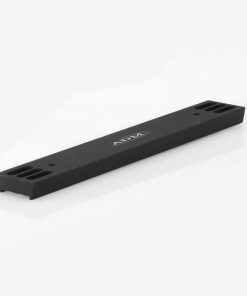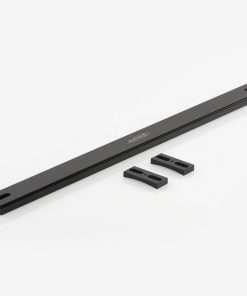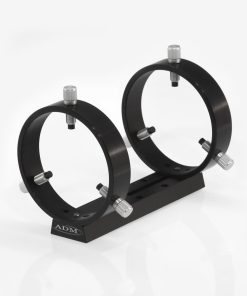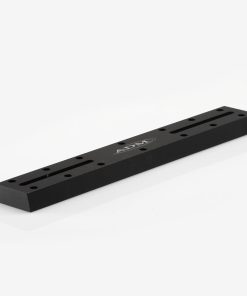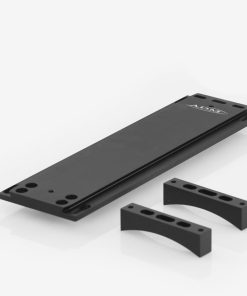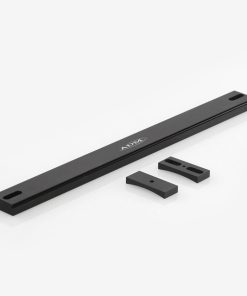Baader Planetarium 5mm Hyperion Telescope Eyepiece – HYP-5 Baader
$ 169,00 $ 67,60
Baader Planetarium 5mm Hyperion Telescope Eyepiece
This Baader Planetarium Hyperion 5mm 1.25″ Eyepiece is more than just a pretty face! With a 68 degree field of view, coatings that rival eyepieces costing hundreds of dollars more, and great eye relief, the Baader Hyperion’s are the perfect visual eyepiece, however, their innovative auto-locking 2-inch sleeve supports heavy cameras for afocal projection photography with the appropriate Hyperion T-ring.
Baader Hyperion Multi-Purpose 68 Degree Eyepieces – Great for visual use
- All Baader Hyperion eyepieces have an optimal 68-degree apparent field of view, the largest accessible to the stationary human eye. The entire field remains visible despite slight involuntary motions of an observer’s head.
- The annoying “kidney bean effect”, the bane of many ultra wide-field eyepiece designs, is completely absent in the Baader Hyperion.
- Eight lens elements in five groups provide outstanding sharpness and color correction over the entire field.
- This Baader 5mm Hyperion eyepiece has 20mm of comfortable eye relief.
- No vignetting or falloff of illumination near the edge of the field.
- The use of high-index glass results in minimal distortion and astigmatism.
- The Baader Hyperion has unsurpassed color fidelity. Many eyepieces that employ cheaper glasses or inferior designs impart a yellow or blue cast to the image. With Hyperion eyepieces, white stays white!
- The most advanced anti-reflection multi-coatings are employed on all ten air-to-glass surfaces for maximum light throughput and brilliant images. All coatings are carefully matched to the index of refraction for each of the different glass substrates used.
- The painstaking design and execution of baffling have all but eliminated troublesome stray light and ghost reflections. Under all conditions of illumination, the interior of a Hyperion eyepiece will appear jet black, testimony to the virtual elimination of stray light.
- The Hyperion has the shortest field stop position of all wide field eyepieces known.
- Specifically designed for binocular viewing. Ideal for use with accessory binocular viewers thanks to a tight barrel diameter (58 millimeters with the removable neoprene rubber grip ring, 56 millimeters with the grip ring removed) that permits interpupillary distance settings of as little as 56 millimeters.
- Each Baader Hyperion eyepiece in the series is actually two eyepieces in one! A much longer focal length lens can be created by unscrewing the forward 1.25-inch diameter portion of the barrel that houses the negative achromat lens group. Color correction remains excellent, and the field curvature that results is no greater than in a decent specimen of the 6-element Erfle design. Removing the negative lens group exposes an M48 female thread so that large-format light pollution and nebular filters can be employed.
- Thanks to the short 1.25 chrome sleeve of 0.94”, all Hyperion’s are principally compatible with spotting scopes, including high-end units by Leica, Swarovski, and Zeiss.
The perfect eyepiece for afocal projection imaging
- The digital camera threads S54 and M43 x 0.75 have been incorporated into the Hyperion eyepiece for compatibility with the Baader Series 54 digital T-rings. With a Series 54 t-ring installed on the Hyperion, you can attach almost any digital and video camera without vignetting. These threads are protected by caps when not in use.
- The vast majority of large digital cameras and camcorders of recent vintage feature an internal zoom lens with a fixed front lens and standard filter threads.
- The robust construction of Hyperion eyepieces is capable of directly supporting heavy video and film cameras weighing up to 6.6 lb.
- Hyperion eyepieces are also ideal for use with so-called clamping-style universal digital camera holders, and will precisely support cameras squarely with respect to the optical axis, due to their straightforward cylindrical-shaped outer body.
- With or without the removable negative lens group, the Hyperion eyepiece is an incredibly sharp projection system.
- In combination with a short-focus objective as small as 60mm, the same afocal imaging configuration can be employed in the industry for monitoring hazardous operations like plasma welding from a safe distance.
Quick Shipping and Professional Packaging
Due to our longstanding partnership with UPS FedEx DHL as well as other major international carriers, we are able to provide various shipping options. Our warehouse personnel are well trained and will be able to pack your goods in accordance with the exact and precise specifications. Your goods are thoroughly checked and securely secured prior to shipment. Everyday we deliver hundreds of packages to our customers from all over the world. Our determination to be the biggest online retailer in the world is shown by this. The warehouses are located situated in Europe in the same way as they are in the USA.
Note: Orders containing multiple items will have a separate processing period for each item.
We will carefully examine all products before they are shipped. Today, the majority of orders will be delivered within 48 hours. The delivery time will be between 3-7 working days.
Returns
We don't manage the stock at our warehouse and factory. The actual inventory may fluctuate at any time. It's possible that you may not receive your order once it's been placed.
Our policy is for 30 days. We are unable to return or exchange your purchase after 30 days since the purchase.
In order for your item to be eligible for return the item must not be opened and in the condition you received it. It must also remain in the original packaging.
Related products
Telescope Accessories
ADM Accessories Tripod Knob Set for Losmandy G11 & Celestron CI700 Mounts – Clear – TKS-CL ADM
Telescope Accessories
ADM Accessories Tripod Knob Set for Losmandy G11 & Celestron CI700 Mounts – Red – TKS-RE ADM
Telescope Accessories
ADM Accessories Rosette Tripod Knobs for Celestron Advanced VX Mount – VX-TKS ADM
Telescope Accessories
ADM Tripod Knob Set for Celestron CGE Pro Mount – CGE-PRO-TKS ADM
Telescope Accessories
ADM V Series Universal Dovetail with 125 mm Rings – VDUPR-125 ADM
Telescope Accessories
Telescope Accessories
ADM Accessories Vixen Style Universal Dovetail Telescope Mounting Bar – 7″ Long – VDUP7 ADM
Telescope Accessories
Astrozap Aluminum Dew Shield for Celestron 14″ EdgeHD SCT – AZ247 Astrozap
Telescope Accessories
ADM V Series Dovetail Bar for Celestron 8″ SCT – Orange Anodized – VC8-O ADM
Telescope Accessories
ADM Accessories Vixen Style Universal Dovetail Telescope Mounting Bar – 14″ Long – VDUP14 ADM
Telescope Accessories
ADM Accessories Vixen Style Dovetail for Meade 10″ SCT – VM10 ADM
Telescope Accessories
ADM Mini Electronics Pier Knobs for Celestron CGE Pro Mount – CGE-PRO-MP ADM
Telescope Accessories
AstroZap 10″ Dobsonian Telescope Light Shield – AZ1202 Astrozap
Telescope Accessories
ADM V Series Dovetail Bar for Newer Celestron 6″ SCT – VC6 ADM
Telescope Accessories
ADM Accessories Vixen Style Dovetail for Meade 8″ SCT – VM8 ADM
Telescope Accessories
Telescope Accessories
ADM V Series Universal Dovetail with 100 mm Rings – VDUPR-100 ADM
Telescope Accessories
ADM Accessories Vixen Style Universal Dovetail Telescope Mounting Bar – 11″ Long – VDUP11 ADM
Telescope Accessories
ADM Replacement Spreader Bar Knobs for Celestron Advanced VX Mount – VX-SB ADM
Telescope Accessories
ADM Accessories CGEM Knob Upgrade – Two Orange Anodized Rosette Saddle Knobs – CGEM-SAD-OR ADM
Telescope Accessories
Astrozap Aluminum Dew Shield for Celestron 8″ SCT – Texture Black – AZ208-TB Astrozap
Telescope Accessories
Astrozap Aluminum Dew Shield for Celestron 8″ EdgeHD SCT with Top & Bottom Notches – AZ245 Astrozap
Telescope Accessories
Telescope Accessories
Telescope Accessories
ADM Accessories Vixen Style Dovetail for Celestron C8 – VC8 ADM
Telescope Accessories
Astrozap Aluminum Dew Shield for Celestron 11″ SCT – Texture Black – AZ213-TB Astrozap
Telescope Accessories
ADM Accessories CGEM Knob Upgrade – Two Orange Anodized Spreader Bar Knobs – CGEM-SB-OR ADM
Telescope Accessories
ADM Accessories CGEM Knob Upgrade – Orange Tripod Knob Set – CGEM-TKS-OR ADM
Telescope Accessories
ADM Mini Dovetail Bar for Celestron 9.25″ SCT – MDS-C925 ADM
Telescope Accessories
ADM Accessories Tripod Knob Set for Losmandy G11 & Celestron CI700 Mounts – Black – TKS-BK ADM

























